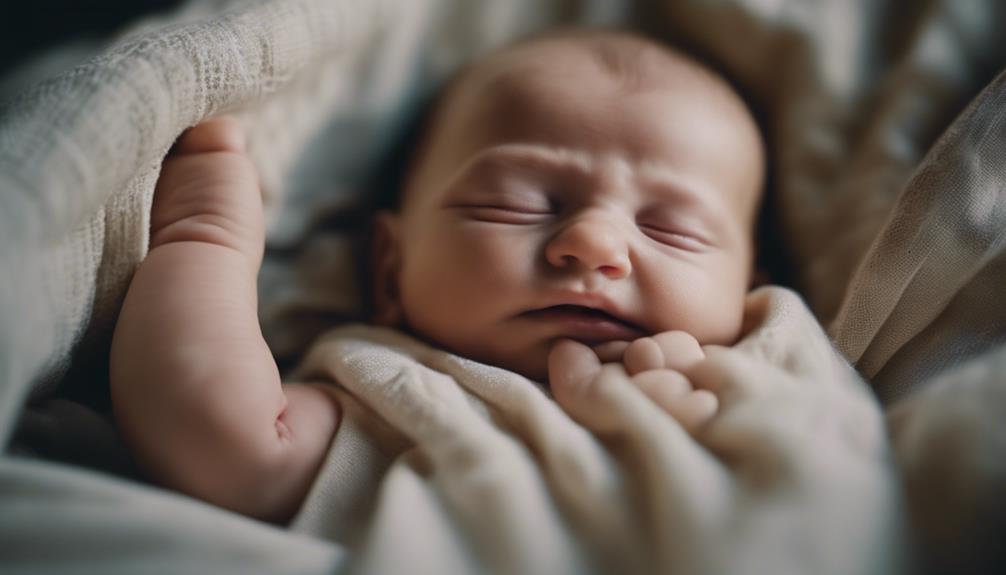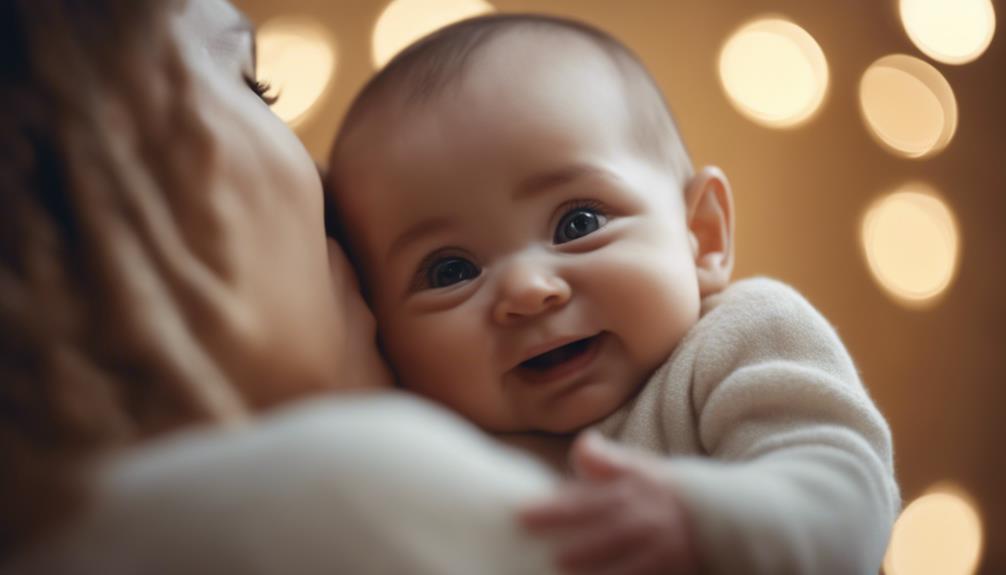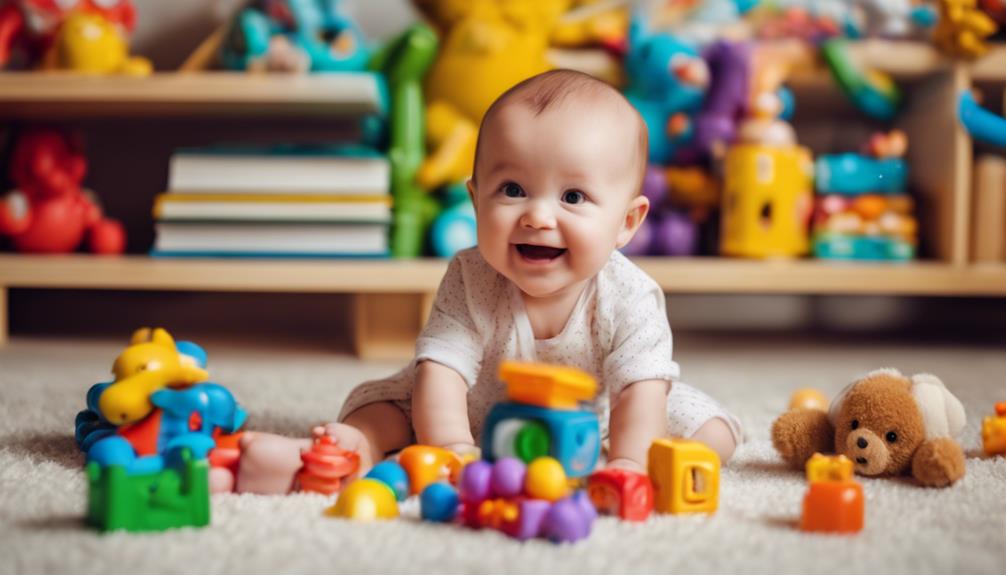Your baby demonstrates love with clear signals that strengthen your emotional connection. Making eye contact and smiling, seeking comfort in your arms, responding to your voice, recognizing your scent, and showing affection through touch all demonstrate their feelings. When your baby shows excitement in your presence, expresses love with cuddles, and seeks reassurance in your embrace, they are deepening the bond even more. These actions are not random, but intentional ways your baby communicates affection and trust towards you. These signs serve as tangible evidence of the strong emotional bond you have. There are more insights to come on this wonderful parenting journey.
Key Takeaways
- Seeking comfort and reassurance through hugs and snuggles.
- Responding to familiar voices with recognition and trust.
- Making eye contact and sharing smiles to build emotional connection.
- Recognizing caregiver's scent for comfort and reduced stress.
- Showing affection through touch, reaching out for closeness.
Eye Contact and Smiles
Around 6-8 weeks old, your baby begins establishing eye contact with you, seeking attention and building trust. This eye contact serves as a fundamental form of communication, enabling your little one to engage with familiar faces and connect emotionally.
As your baby grows, around 2 months old, intentional social smiles start to appear, indicating a deepening affection and attachment towards you. Responding to these smiles with warmth and attention not only fosters positive interaction but also strengthens the emotional bond between you and your baby.
It's through these simple yet profound gestures that your baby begins to express love and connection towards you, turning towards your voice and beaming with joy at the sight of your face. These early signs of affection and attachment lay the foundation for a strong and loving relationship between you and your little one.
Seeking Comfort in Your Arms

When your baby seeks comfort in your arms, it's a clear sign of their attachment and trust towards you. Holding out their arms to be picked up is a powerful non-verbal way for babies to communicate their need for physical affection and security.
Being held close in your arms provides them with a secure base from which to explore the world and offers reassurance during times of distress, like when your Baby Cries. This physical closeness not only helps in soothing your baby but also strengthens the emotional connection and Bond With Your Baby.
As pediatrician Dr. Smith notes, 'Babies seeking comfort in your arms is a natural way for them to express their trust and love for you. Responding promptly to their need for physical closeness helps in building a strong emotional bond with your baby.'
Responding to Your Voice

When babies respond to your voice, it's a sign of their attachment and recognition.
Research shows that infants as young as 4 months old can differentiate familiar voices and show a preference for them.
This early responsiveness to your voice lays the foundation for a strong emotional bond with your baby.
Voice Recognition Cues
As a parent, talking and reading to your baby before birth establishes familiarity with your voice, prompting early recognition and connection. Babies are known to respond to familiar voices by turning towards them, displaying recognition and forming emotional bonds. This recognition through auditory cues is an important step in building trust and a strong connection with your little one.
When your baby gazes at you or turns their head towards your voice, they're expressing love and trust in their caregivers, laying the foundation for a secure attachment. Research indicates that babies are sensitive to the voices they hear regularly, especially those of their caregivers. According to child development experts, this responsiveness to familiar voices helps infants feel safe and loved, fostering a deep emotional bond.
Comfort in Hearing
Babies demonstrate comfort in hearing familiar voices by turning towards them early on, showing recognition and forming attachment. This bond is an essential part of the emotional development and bonding process between caregivers and infants.
Here are three key ways this comfort in hearing plays a role in the baby's love and trust towards you:
- Establishing Early Connection: Talking and reading to the baby even before birth can help create familiarity with your voice, laying the foundation for a strong emotional bond.
- Nonverbal Communication: Gazing and moving their heads towards your voice are nonverbal cues through which babies communicate their comfort and trust in you, enhancing the bonding process.
- Strengthening the Relationship: Recognizing and responding to the baby's vocal interactions and cues further solidifies the connection and love between you and your little one.
Recognizing Your Scent
Your baby's ability to recognize your scent is an important tool in fostering a strong emotional bond and sense of security.
From birth, babies have an innate capacity to associate their caregiver's scent with comfort and protection. Research shows that familiar scents play a vital role in reducing a baby's stress levels and promoting bonding with their primary caregiver.
The smell of a parent's skin or breast milk can provide not only physical comfort but also emotional reassurance to the baby, helping them feel safe and loved in their caregiver's presence.
Recognizing your scent is a way for babies to express their attachment and love towards you. It enhances the emotional connection between you and your little one, creating a deep sense of trust and security.
Embracing your natural scent and maintaining close physical contact with your baby can greatly contribute to strengthening your relationship and promoting a healthy emotional bond.
Showing Affection Through Touch
Recognizing your baby's affection through touch is a key component in strengthening your emotional bond and nurturing a sense of security between you and your little one. Babies show their love and trust through physical closeness, seeking reassurance, and expressing affection in various ways:
- Snuggling for Comfort: Infants often seek physical closeness by snuggling into you for comfort and security, showing their need for your presence and affection.
- Reaching Out for Contact: Babies express love and trust by reaching out to be held and seeking physical contact with familiar caregivers, indicating their attachment and desire for connection.
- Holding Out Arms for Reassurance: When babies hold out their arms to be picked up, they're showing affection and seeking reassurance, strengthening the bond between parent and child through physical touch.
Displaying Excitement in Your Presence

When in the presence of their caregivers, infants often exhibit genuine excitement and happiness, displaying physical responses like bouncing or reaching out. The sight of you can trigger joyful reactions in babies, evident through their smiles, cooing, and kicking legs.
Your role as a caregiver is paramount in a baby's emotional development, bringing them comfort and joy. The return of parents sparks enthusiastic responses from infants, showcasing the deep attachment and love they feel. Babies express their affection through physical gestures, like seeking to be picked up and finding solace in your arms.
Research indicates that these reactions stem from the strong bond and emotional connection babies form with their primary caregivers. Therefore, your presence isn't only met with excitement but also serves as a source of security and happiness for the child, reinforcing the attachment and love they've for you.
Expressing Love With Cuddles

Expressing affection through cuddles, babies demonstrate their love and trust in you. This physical contact goes beyond just seeking warmth; it signifies a deeper emotional bond and sense of security for your little one.
Here's why cuddling is a powerful way for babies to show their love and strengthen their connection with you:
- Love and Affection: Snuggling into your arms is a clear display of the love and affection your baby feels towards you. It's a way for them to seek comfort and closeness, showing that they feel safe and loved in your presence.
- Trusts and Feels Safe: When your baby snuggles up to you, it indicates a strong level of trust and feeling of safety. This physical closeness helps build a sense of security for the infant, fostering a trusting relationship between you and your little one.
- Emotional Bond: Cuddling creates a strong emotional connection between you and your baby. It's a way for them to seek comfort and reassurance, ultimately strengthening the bond between parent and child.
Seeking Reassurance in Your Embrace

Babies often seek reassurance in your embrace, showing their trust and affection towards you through physical gestures like holding out their arms. This behavior is a clear indicator of the emotional bond your baby feels towards you.
When a baby loves and trusts you, they'll seek comfort and security in your arms. According to child development experts, asking to be held is a way for babies to feel secure and loved, reinforcing the attachment they've with their caregivers.
Holding out arms to be picked up is a common physical expression of love and affection from a baby towards their parents. It's a simple yet powerful way for babies to seek reassurance and strengthen the emotional connection with their primary caregivers.
Frequently Asked Questions
How to Tell if a Baby Is Attached to You?
You can tell if a baby is attached to you when they seek comfort, show joy in your presence, reach out for physical contact, and react positively to interactions. Your baby's emotional responses reflect their love and trust.
How Do I Know if My Baby Has a Strong Bond With Me?
You know your baby has a strong bond with you when they seek comfort in your arms, look to you for reassurance, smile and engage with you, and show excitement and joy upon seeing you.
How to Tell if Your Baby Loves You?
You can tell your baby loves you when they smile brightly, reach out for your embrace, and show genuine joy in your presence. Their little gestures and happy reactions speak volumes about their affection for you.
Can Your Baby Get Attached to Someone Else?
Yes, your baby can get attached to someone else. Babies can form strong bonds with multiple caregivers, including grandparents, siblings, or regular caregivers. Consistent and responsive care from different trusted adults can foster healthy attachments alongside the primary caregiver.
Conclusion
To sum up, the signs of your baby's love are clear and unmistakable. From seeking comfort in your arms to showing affection through touch, your little one's emotional bonds with you're strong and genuine.
As you bask in their smiles, cuddles, and excitement in your presence, remember that these gestures are a reflection of the deep connection you share. Embrace these moments and cherish the love that your baby expresses in their own unique way.








